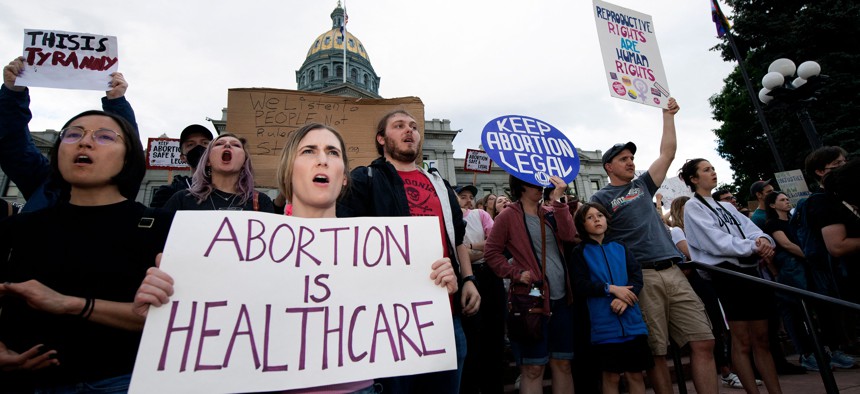Roe is Gone. States and Localities Must Protect Reproductive Rights

Abortion rights activists protest in front of the Colorado State Capital after the overturning of Roe vs. Wade. Getty Images/Jason Connolly
COMMENTARY | The 50-year era of Roe v. Wade has ended. We need a new movement in America to elect leaders who will restore the rights that have been ripped away.
In a deeply troubling 6-3 decision in the Dobbs v. Jackson Women’s Health Organization case, the Supreme Court eliminated the 50-year constitutional right to seek an abortion—going against the will of the majority of Americans. Now, access to reproductive care is at the mercy of politics, erasing the protections that Roe provided.
It will cost lives, eliminate access to health care for millions, especially low-income people and people of color, and fundamentally change the relationship between people and the government.
As a result of this decision, the next battle for reproductive rights will move to states and local governments.
At least 13 states have in place so-called “trigger laws” that will completely eliminate access to abortion in those states the moment that the decision in the Dobbs case is certified. Other states have—and will continue to—further limit access to health care and family planning services to the point where it’s nonexistent.
States Defending Reproductive Rights
But all is not lost. Across the country, some courageous state and local leaders are standing up and fighting for the right to choose.
Colorado Gov. Jared Polis and New York Gov. Kathy Hochul, both Democrats, are taking significant steps to fortify access to abortion including for out-of-state residents. Colorado passed the Reproductive Health Equity Act, guaranteeing access to reproductive care before and after pregnancy. New York has approved measures to shield providers and patients from out-of-state legal action.
In Maryland, the Democratic-controlled state legislature passed a law (overriding a veto of Republican Gov. Larry Hogan) that would provide training for medical professionals including nurse practitioners, physician assistants and nurse midwives to perform abortions. It also provides funding to reduce health disparities and ensure that Maryland Medicaid funds can support abortions.
In Oregon, the legislature spent more than $15 million to help the state expand its health-care workforce, and Connecticut approved a bill that would shield providers from facing penalties from other states.
Meanwhile, some local prosecutors in southern right-leaning states such as Virginia, Georgia, Louisiana, Texas and Tennessee have said that they will not enforce abortion bans or use scarce resources to investigate and try patients and providers accused of breaking state laws.
And mayors across the country have weighed in with resolutions and public statements, reaffirming their strong support for safe, comprehensive reproductive health care.
This is just the tip of the iceberg. Pragmatic progressive leaders at every level of government are looking for additional ways to expand access to care, protect patients and health-care providers and ensure that abortion access going forward isn’t just limited to the wealthy.
Looking Ahead
In the short run, state and local leaders should band together, share policies that work, and do all they can to preserve meaningful access to health-care and family-planning services in America, recognizing that limits and bans on abortion could also affect access to other services.
Long term, we must face the reality that Americans can no longer expect the justice system to intervene to protect individuals and their doctors from political interference in this very personal health decision.
That’s why we need a new movement in America to elect leaders who will restore the rights that have been ripped away. While that must include strong majorities in Congress and Democratic presidents, state and local elections are vital. Every vote that reduces the extremism in state legislatures, elects governors and legislators who will protect reproductive rights and elevates key leaders in other positions, like the prosecutors mentioned above, will help Americans get access to the care they deserve.
Roe is gone. There’s nothing we can do about that. Now we must begin the long road back to reestablishing the guarantees that stood for half a century—starting at the state and local level.
Debbie Cox Bultan has 25 years of experience in politics, public policy and nonprofit leadership. As CEO of NewDEAL, she oversees strategy and day-to-day operations for the organization. Prior to helping launch NewDEAL, she spent 15 years at the Democratic Leadership Council.
NEXT STORY: Football Coach Had Right to Pray on School Field, Supreme Court Rules





